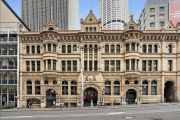
Melbourne Theosophical Society building to be demolished for 13-storey “micro hotel”
The 1920s Melbourne Theosophical Society building will soon be bulldozed, with its demolition and a hotel development application given the green light.
The five-storey building at 124-130 Russell Street, Melbourne, which is not heritage-listed, will be replaced with a 13-level “micro hotel”. Architects Buchan Group claim it will be the city’s first.
The micro hotel will have 160 rooms, with many being as small as 18 square metres, which is slightly bigger than an average car parking space.
Apart from the small rooms, public spaces in the hotel will be larger, including restaurants, basement nightclub and a rooftop bar.
The micro hotel concept was “a response to the rising cost of land in large cities”, according to Buchan’s website. This has prompted some hotel players to “forgo lavish, opulent suites in favour of economical, compact domiciles”.
The 519-square-metre property is being developed by Melbourne-based Longriver Group, led by “Andrew” Yunhe Yu, which claims to have an $800 million property development pipeline on its website, including a $90 million Box Hill hotel.
Mr Yu bought the fully leased building for about $23 million in mid 2017 on a yield of 0.69 per cent, signifying the strong development prospects of the site.
Before that, the Melbourne Theosophical Society had held it for 45 years, purchasing it for $180,000 in 1972.
The approval comes as new data shows the hotel occupancy rate in the Melbourne CBD is almost 86 per cent, according to Colliers International’s latest hotel report. More than 3000 rooms are under construction while a further 7000 are in the planning stages.
“Melbourne’s long-term fundamentals remain strong as the city has shown strong appeal with growth from inbound segments with a large Asian resident population, dynamic dining scene and easy access to many of the desired attractions and activities across the state,” the report wrote.
Longriver Group has been contacted for comment, while the Buchan Group declined an interview.
Heritage concerns
Melbourne Heritage Action had called for an interim heritage overlay to be applied on the site back in July, which could have protected the building from demolition while being assessed for a heritage listing.
Melbourne Heritage Action’s Tristan Davies said the council’s decision was “very unfortunate”.
“It’s a building that’s been acknowledged as being significant for a lot of reasons in the (Future Melbourne Planning Committee) heritage report.”
That report described the property to be “representative of an interwar commercial building with an integrity that (is) relatively high” and was one of the places recommended for heritage overlay.
“We just hope it won’t get demolished within five years and then it will be heritage listed,” Mr Davies said.
Mr Davies added that while the growth of Melbourne and the addition of more hotels was positive, the government was not getting the balance right between preserving Melbourne’s character and increasing the city’s attraction as a tourist destination.
“I don’t think (the balance) is that great at the moment, including the Campbell Arcade being potentially demolished for the railway tunnel. It’s all about how we manage change and doing it in a better way, because we are at risk of Melbourne becoming a gentrified city with not much going on,” he said.
“I think it’s good to have more accommodation areas but we’re doing it in a way at the moment that seems to just be demolishing anything that people come to Melbourne to experience, whether it’s a cinema or a theatre or a quirky building with weird little bookshops in it.”













